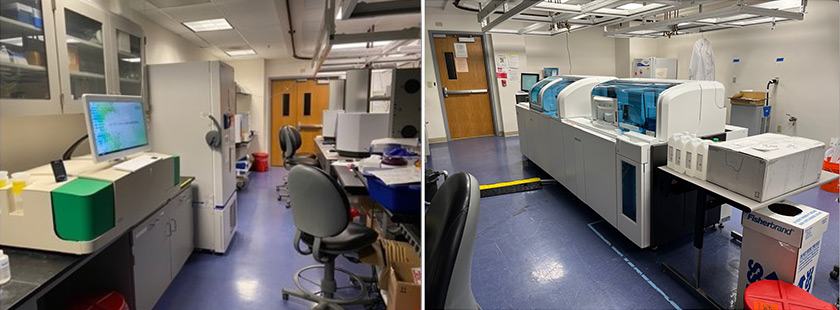Clinical Investigational Lab

- High sensitivity quantitative SARS-CoV-2 RT-PCR testing
- Full clinical chemistry mirroring clinical laboratory (2022)
- SARS-CoV-2 variant sequencing in partnership with Genomic Shared Resource
- Predictive analytics (in-house autoML)
- Commercial IVD manufacturers
- UC Davis start-ups and investigators
- External academic institutions
Services
Molecular / Tissue Diagnostics
- Digital Droplet PCR
- SARS-CoV-2 Testing
- Open Plate Real-Time PCR
- Rapid Multiplex RT-PCR
- Respiratory Panel
- Pneumonia Panel
- Biothreat Panel
- GI panel
- Meningitis Panel
- Joint Infection Panel
Chemistry and Immunoassays
- Automated Chemistry
- Electrolytes, Glucose, BUN, Creatinine
- Blood Gases
- Lipase, Total Protein, Albumin, AST, ALT, Calcium
- Automated Immunoassay
- Cardiac biomarkers
- Cancer biomarkers
- Hormones
- Therapeutic Drug Monitoring
- Toxicology
- Infectious Diseases
- Vitamins
- Mass Spectrometry
Hematology / Coagulation
- Thromboelastography
- Platelet Function Assay
- Complete Blood Count
- Hemoglobin
- Hematocrit
- Platelets
- White blood cell count w/ differential
Predictive Analytics
- Data from both health system and the CDxI investigational laboratory provide means to apply data sciences.
- Use of novel automated machine learning accelerates identification of new algorithms that have clinical potential.
- Traditionally, ML models are programmed manually by a highly trained data scientist.
- Manual programming relies on the data scientists expertise and perhaps prior assumptions and biases to produce and refine models.
- MILO does not come in with assumptions or biases. All combinations of features (predictors) are trained-tested across common ML methods.
- Let the user decide which model is best based on MILO’s output.



